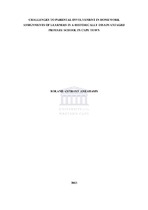Challenges to parental involvement in homework assignments of learners in a historically disadvantaged primary school in Cape Town
Abstract
South Africa is amongst the lowest performers in numeracy and literacy in the developing countries, according to Progress in International Reading Literacy Study (PIRLS 2006). Systemic research conducted by the Western Cape Education Department has pointed to the fact that the literacy and numeracy skills of the learners in the Western Cape are far below what is required for them to learn and develop effectively. Many educators blame parents for learners’ poor academic achievement. This study therefore aims to explore challenges to parental involvement in the homework assignments of learners in a historically disadvantaged primary school in Cape Town. This exploratory qualitative case study followed an interpretive paradigm. Data was collected via field notes; and semi – structured interviews from individuals and focus groups. Thematic data analysis was used to determine challenges to parental involvement in homework assignments of the primary school learners. This research study is grounded on Epstein’s model of overlapping spheres of influence of family, school and community on learners’ learning; six typologies of parental involvement; and on Bronfenbrenner’s bio-ecological model of human development. General systems theory was kept in mind during the study. Where parents were not involved in homework assignments, it was not a deliberate act. The findings highlighted challenges such as poverty, unemployment, inequalities; lack of educational resources; lack of structure in the home; single parenting, school and community factors, and a lack of educational stimulation that negatively affected parental involvement in homework assignments. The blame that educators apportioned on parents for learners’ poor academic outcomes was thus found to be inaccurate. True systems thinkers never debate whether the cause or the solution is situated in one single system, but considers the interdependence between all the systems. The whole is therefore more important than the sum of the parts. Despite the many challenges that parents experience in helping the learners with homework, the parents still want their children to excel in academic work. Parents in the historically disadvantaged school however seek assistance in how to help the learners with homework assignments.

